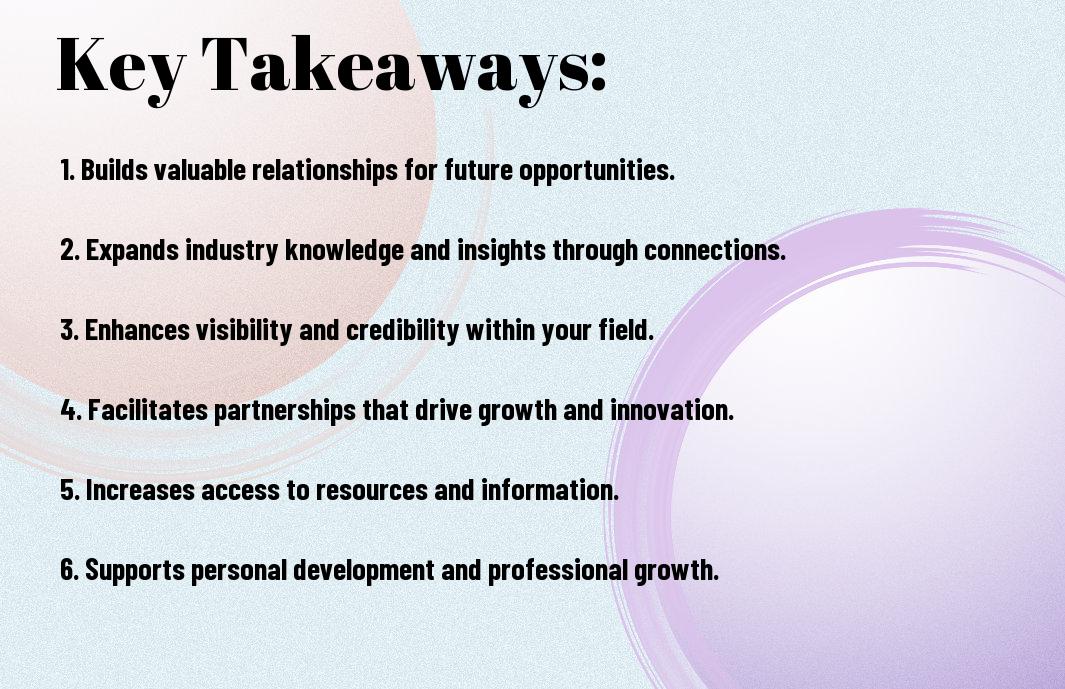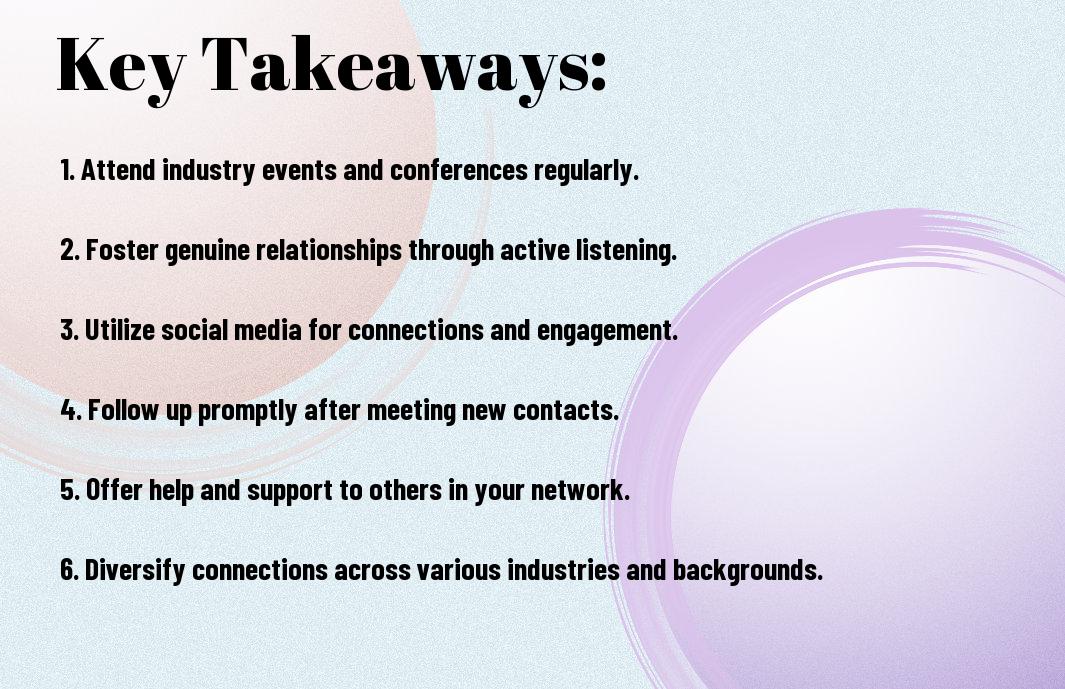It’s necessary to understand that networking can play a pivotal role in your business journey. By building and nurturing relationships with other professionals, you open doors to new opportunities, insights, and partnerships that can significantly enhance your success. Whether you’re attending industry events, joining online forums, or simply reaching out to peers, effective networking can lead to valuable collaborations and support that help you grow. In this post, we will explore the key benefits of networking and provide strategies to help you maximize your connections for business success.
Key Takeaways:
- Opportunity Creation: Networking opens doors to new opportunities, including partnerships, clients, and investors.
- Knowledge Sharing: Building a network facilitates the exchange of ideas and insights, enhancing your understanding of industry trends.
- Trust Building: Establishing connections with others fosters trust and credibility, which are vital for long-term business relationships.
- Support System: Networking provides access to a support system of peers who can offer advice, feedback, and encouragement during challenges.
- Brand Visibility: Engaging in networking activities increases your brand’s visibility and can lead to referrals and word-of-mouth marketing.

Understanding Networking
Before exploring into the various facets of networking, it’s vital to grasp what networking truly entails. This foundation will allow you to recognize its value in fostering relationships, exchanging information, and creating opportunities that can lead to business growth and success.
Definition of Networking
Any effort you make to connect with others in your industry or related fields is considered networking. It involves building and nurturing relationships that can benefit you and your business over time, facilitating collaboration and resource sharing while enhancing professional development.
Types of Networking
Before you can effectively engage in networking, it’s vital to understand the different types available. Here’s a breakdown of the primary categories:
| Type of Networking | Description |
|---|---|
| Personal Networking | Connecting with individuals in informal settings. |
| Professional Networking | Building relationships through industry events and seminars. |
| Online Networking | Utilizing social media platforms for connections. |
| Strategic Networking | Focusing on specific goals and aligning with key influencers. |
| Informal Networking | Creating connections in everyday situations. |
Thou can establish a diverse network that enhances your visibility and opportunities within your industry.
Before you choose your networking path, think about how different types can align with your goals. Each type allows you to engage with a varied audience, which can lead to unique opportunities tailored to your aspirations. Here are prominent types of networking to consider:
| Prominent Types | Key Features |
|---|---|
| Event Networking | Connecting with peers at industry conferences and workshops. |
| Referral Networking | Leveraging existing connections to gain new clients. |
| Social Networking | Engaging with potential contacts on social media. |
| Community Networking | Collaborating within local business groups or organizations. |
| Mentorship Networks | Forming relationships with those who can guide you. |
Consequently, exploring these types will allow you to tailor your networking approach to effectively meet your business needs. By understanding and participating in various networking types, you can cultivate meaningful relationships that may be pivotal in your professional journey. Thou should always aim to expand and diversify your network for maximum impact.

Benefits of Networking
The power of networking lies in its ability to enhance your business ventures. Through connecting with others, you can access valuable insights, resources, and support that can boost your business growth. Networking not only opens doors to new opportunities but also helps in staying updated with industry trends and best practices. These interactions are vital for building your brand and finding potential customers or partners who can propel your business forward.
Expanding Opportunities
At the heart of effective networking is the ability to expand your opportunities. Each connection you make can lead to new prospects, whether it’s job openings, partnerships, or collaborations. Engaging with a diverse group of professionals allows you to explore different viewpoints and identify gaps in the market that your business can fill. By actively participating in networking events and forums, you can position yourself to seize these valuable opportunities as they arise.
Building Relationships
Around the core of successful networking are the relationships you cultivate with others. These connections are more than mere acquaintances; they are built on trust, respect, and mutual benefit. By investing time in nurturing these relationships, you establish a support system that can provide guidance, advice, or referrals when you need them most. Strong networks create community, allowing you to exchange ideas and solutions that can elevate your business.
Relationships in business thrive on consistent engagement and genuine interest in each other’s success. By following up after initial meetings, offering assistance when possible, and being active in your network, you solidify trust and rapport. This ongoing communication fosters collaboration, where you can share resources and insights with one another. Over time, these strong connections can lead to referrals, partnerships, and an interconnected community that fosters collective success.
Networking Strategies
Despite the challenges of finding new connections, implementing effective networking strategies can significantly enhance your business success. Start by attending industry-related events, where you can engage with like-minded professionals and potential clients. Additionally, consider joining networking groups or clubs that align with your goals. By being proactive and seeking opportunities to connect, you can build a strong, supportive network that helps you grow your business.
Effective Communication Skills
The ability to communicate effectively is vital in establishing and nurturing your network. Whether in person or online, you should focus on active listening, asking relevant questions, and articulating your ideas clearly. This will not only help you forge stronger connections but also ensure that others feel valued in the conversation.
Leveraging Social Media
After developing your communication skills, it’s important to leverage social media to expand your networking reach. Platforms like LinkedIn, Twitter, and Facebook can provide powerful tools for connecting with industry peers and potential clients. By actively engaging with relevant content and joining groups, you can showcase your expertise and build valuable relationships online.
Another effective approach to leveraging social media is to share insights and experiences related to your business. By posting regular updates, articles, or even engaging with discussions, you increase your visibility and attract like-minded individuals. This not only positions you as a thought leader in your field but also opens doors to new connections and collaboration opportunities. Be sure to interact with your audience by responding to comments and messages, fostering a sense of community around your professional brand.
Networking Events and Workshops
Many entrepreneurs find that attending networking events and workshops is a powerful way to build valuable connections. These gatherings allow you to meet industry leaders, peers, and potential clients, fostering relationships that can propel your business forward. Learning from others and sharing experiences can also be transformative. For insights on why these connections matter, you can explore How Networking Powers Business Growth.
Choosing the Right Events
Events should align with your business goals and target audience. Take the time to research upcoming opportunities that attract individuals and organizations relevant to your industry. Select gatherings that offer sessions, panels, or workshops that can enhance your skill set and knowledge base.
Maximizing Event Participation
Any effort you put into participating in networking events can yield significant returns. This includes preparing an elevator pitch, having business cards handy, and researching attendees beforehand to identify key individuals you want to connect with.
In addition, actively engaging during events can set you apart. Approach fellow participants with genuine interest, ask insightful questions, and be open to sharing your experiences. Following up with your new connections post-event solidifies those relationships and opens doors for future collaborations or mentorship opportunities.
Overcoming Networking Challenges
For many, networking can feel intimidating, but overcoming these challenges is imperative for business success. Whether it’s a lack of confidence, time constraints, or discomfort in social situations, recognizing and addressing these obstacles can enhance your networking experience and expand your professional connections.
Common Barriers to Networking
Barriers to effective networking can include anxiety, busy schedules, and the fear of rejection. These challenges can create a mental block that hinders you from taking the necessary steps to build relationships. Identifying these barriers is the first step toward conquering them.
Tips for Introverts
For introverts, networking can be particularly challenging, but there are strategies that can make it easier. Consider practicing your elevator pitch, focusing on one-on-one interactions, and preparing questions in advance. By utilizing these techniques, you can navigate networking events with greater ease.
- Practice active listening to engage others effectively.
- Choose smaller, more intimate networking events.
- Prepare conversation starters related to your interests.
- Follow up with new contacts via email or social media.
Even if networking feels overwhelming, having a plan can significantly ease your discomfort. Try to set achievable goals, like initiating a single conversation or attending just one event per month. Setting realistic expectations can help you build confidence over time.
- Seek out events related to your industry or hobbies.
- Consider volunteering to help organize networking activities.
- Practice your social skills in low-pressure environments.
- Establish small talk routines to help ease into conversations.
Success Stories
All successful entrepreneurs understand the value of networking in their business journeys. By building and nurturing connections, they open doors to new opportunities and collaborations that drive growth. If you’re curious about how networking has contributed to business success, check out The Importance of Networking in Business for insightful examples.
Case Studies of Networking Impact
About various businesses have leveraged networking to achieve remarkable results. Here are some case studies showcasing the impact:
- Company A: Increased revenue by 40% in one year after joining industry networking groups.
- Company B: Grew partnership opportunities by 60% through strategic alliances formed at networking events.
- Company C: Secured $100,000 in funding by pitching to investors met through local networking initiatives.
- Company D: Expanded market reach by 30% through referrals from their professional network.
Testimonials from Industry Leaders
An impressive network often leads to significant advantages in business. Industry leaders frequently emphasize how their connections have guided their success. Networking fosters relationships that provide you with valuable insights and opportunities for growth.
In fact, many entrepreneurs credit their networks for critical business breakthroughs, from innovative partnerships to mentorship guidance. By forging meaningful connections, you can unlock the potential for collaboration that can elevate your business to the next level.
Final Words
Ultimately, your success in business greatly hinges on the relationships you cultivate through networking. By actively engaging with peers, mentors, and potential clients, you create opportunities that can lead to growth and innovation. Your network not only provides support and resources but also opens doors to collaborations and partnerships that can elevate your endeavors. Embrace networking as a strategic tool to enhance your visibility and credibility in your industry, and you’ll find your path to success becoming clearer and more attainable.
FAQ
Q: Why is networking important for business growth?
A: Networking provides valuable opportunities for business growth by allowing entrepreneurs and professionals to connect with potential clients, partners, and industry peers. It helps to build meaningful relationships that can lead to collaborations, referrals, and insights into market trends. Engaging with a network can also provide support during challenges and facilitate knowledge sharing that can enhance business strategies.
Q: How can networking help in finding new clients?
A: Networking can significantly aid in finding new clients through word-of-mouth referrals and personal introductions. By actively engaging in networking events, conferences, and online platforms, businesses can showcase their offerings and connect with individuals who may require their services. Establishing trust and rapport with potential clients through networking increases the likelihood of converting them into loyal customers.
Q: What are effective ways to expand a professional network?
A: Expanding a professional network can be achieved through attending industry events, joining relevant associations, and participating in online forums and social media platforms. Additionally, volunteering for projects or taking part in community initiatives can broaden connections. Consistent follow-up and genuine engagement with contacts, whether through coffee meetings or social platforms, also help maintain and grow a network over time.

